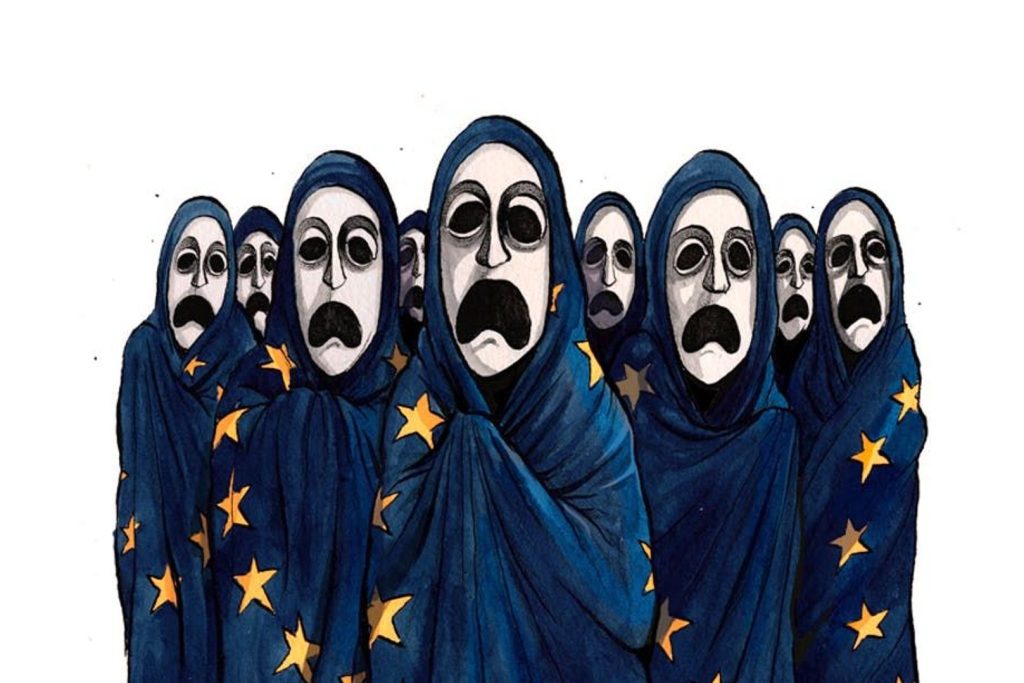France, Sweden, Italy, Finland and now Spain. The demise of the left in western Europe continues apace and yet their only solution is to seethe about fascists in a make believe world of their own.
Nine months after Giorgia Meloni was elected prime minister — remember the hysterical warnings about her being Mussolini in heels — the only horror the Italian left has experienced is electoral wipeout. At last weekend’s local elections, Meloni’s conservative Fratelli d’Italia party romped to victory in many towns that were once staunchly Socialist. As a jubilant Meloni crowed: “Strongholds [of the left] no longer exist.”
Nine months after Giorgia Meloni was elected prime minister, the only horror the Italian left has experienced is electoral wipeout
At the same time Italians were endorsing Meloni, Spanish voters showed what they thought of the ruling Socialist Workers’ Party in their local and religion elections. Not much. The big winners were the Popular Party and Vox, prompting a rattled Prime Minister Pedro Sánchez to call a snap general election. According to El País his Socialist Party needs “a miracle to halt the conservative wave that has already swept through several European countries.”
Vox have in the past been compared to the Nazi Party, though these days the left sees Hitler and Mussolini on every street corner. Querying the wisdom of mass immigration is one short goose-step from fascism, as is sticking up for the traditional family structure or simply waving your country’s flag.
When Meloni was elected prime minister of Italy in September the news wasn’t well received by her French counterpart. One might have expected Elisabeth Borne — a Socialist by breeding before she jumped ship to Macron’s centrist party — to be the first on the phone to celebrate Girl Power. Instead Borne gave a masterclass in pomposity, declaring that Meloni better adhere to European “values,” or else.
Borne was on her high horse again last Sunday, using an interview to describe Marine Le Pen’s National Rally as the “heir to Pétain” and warning against any “normalization” of the party.
Borne’s reference to Marshal Philippe Pétain’s wartime Vichy government has infuriated Le Pen’s party, and even irritated Emmanuel Macron. During a Council of Ministers on Tuesday the president upbraided his prime minister by stating that “you won’t be able to make millions of French people who voted for the far right believe that they are fascists.”
Such tactics might have worked in the 1990s, added the president, “but the fight against the far right no longer involves moral arguments.”
Macron is correct. Had Borne, the daughter of a Holocaust survivor, made her comments three decades earlier she would have been on firmer ground. When Le Pen’s father, Jean-Marie, founded the National Front in 1972 it contained some very unpleasant individuals, including the vice-president, who served in the Milice, Vichy’s paramilitary wing, and the treasurer, who fought for the French Charlemagne Division in the Waffen-SS.
Then again, the Socialist Party of the 1970s also contained some dubious characters, such as its leader, François Mitterrand. He worked for the Vichy regime in the early years of the war and, during his fourteen years as president, he steadfastly refused to apologize for the complicity of France in deporting 74,100 Jews to concentration camps. The Vichy police chief who organized the deportation, Rene Bousquet, was a friend of Mitterrand after the war.
The Vichy period was a complex one for the Republic. As Julian Jackson wrote in France: The Dark Years 1940-1944: “The collaborationist world was not homogeneous — it contained pacifists and fascists, Socialists and Catholics… collaborationist politics was a vipers’ nest of hatreds.”
More to the point, that period is in in the past and it is best left alone by twenty-first century politicians. The same is true in Italy; it’s the present that matters and Meloni’s popularity tells its own story.
So does Le Pen’s, whose party is widely acknowledged to have emerged from the pension reform saga in the best shape. Recent opinion polls indicate that she is enjoying unprecedented levels of approval among the electorate.
The National Rally are also benefiting from the rampant lawlessness engulfing France and the lack of any coherent government strategy to tackle the growing immigration crisis.
These issues explain the recent successes of socially conservative parties throughout most of continental Europe. In truth, however, their popularity has as much to do with voters’ rejection of radical progressivism, the aggressive and divisive dogma that has so intoxicated the left this century.
Politicians like Elisabeth Borne should stop wasting words demonizing the opposition and focus their energy on how they can normalize the left.
Too many on the European left have turned their backs on their traditional bases. They have courted middle-class students and urban elites, pandering to their esoteric social justice obsessions while sneering at the working-class respect for faith, flag and family. Nor do they seem particularly bothered about the crises in health, education and social housing.
That is why Meloni is prime minister and Marine Le Pen’s National Rally have eighty-eight MPs in the National Assembly; not because they are fascists but because they have replaced the left.
This article was originally published on The Spectator’s UK website.

























